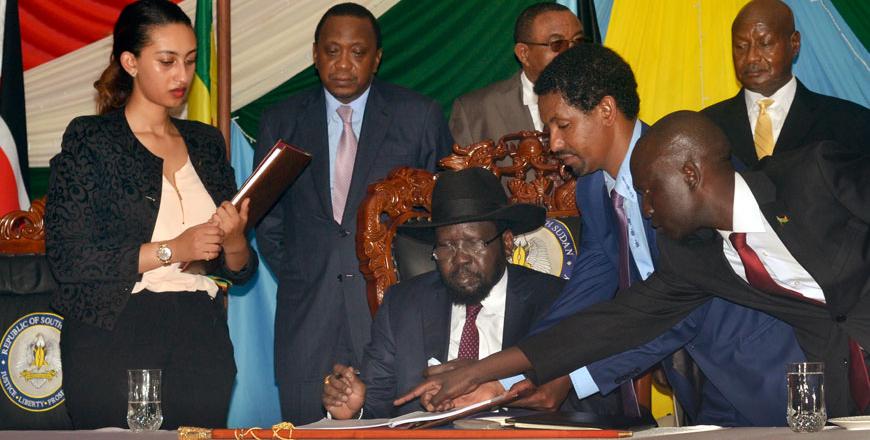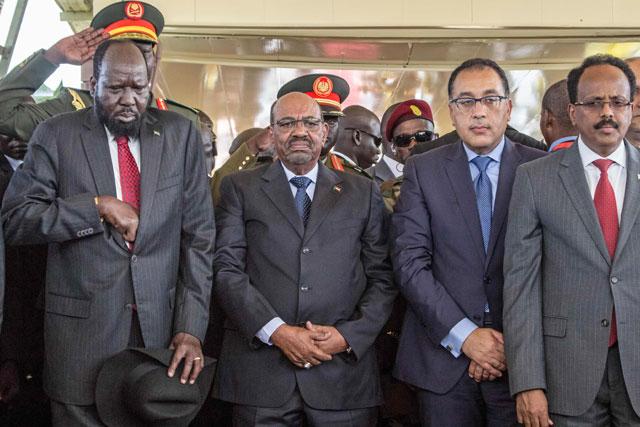You are here
South Sudan leader signs peace deal amid sanctions threat
By AP - Aug 26,2015 - Last updated at Aug 26,2015

South Sudan President Salva Kiir signs a peace deal, as Kenya’s President Uhuru Kenyatta (centre left), Ethiopia’s Prime Minister Hailemariam Desalegn (centre right) and Uganda’s President Yoweri Museveni (right) witness the signing while standing behind in the capital Juba, South Sudan, on Wednesday (AP photo)
JUBA — South Sudan President Salva Kiir on Wednesday signed a peace deal with rebels, more than 20 months after the start of fighting between the army and rebels led by his former deputy.
Kiir signed the agreement in Juba, South Sudan's capital, in a ceremony witnessed by regional leaders. Kiir said he was signing the document despite having serious reservations. He signed the same agreement endorsed by rebel leader Riek Machar, said Kiir's spokesman Ateny Wek Ateny.
Machar, the former deputy president, signed the agreement last week in Ethiopia but Kiir refused, saying he needed more time, drawing condemnation from diplomats who want a quick agreement to end the violence in the world's newest country.
Kiir was under intense pressure to sign the compromise accord mediated by a group of neighbouring countries, with the US threatening new UN sanctions if he failed to do so.
Signing the agreement Wednesday, Kiir said he felt the peace deal had been imposed on him and said it is flawed. Kiir said some aspects of the deal "are not in the interest of just and lasting peace... . We had only one of the two options, the option of an imposed peace or the option of a continued war... We are here talking about peace".
He accused rebels of attacking positions held by government troops in two areas in the volatile state of Unity on Wednesday.
The agreement binds Kiir into a power sharing arrangement with Machar, a political rival whose dismissal in July 2013 sparked a political crisis that later boiled over into a violent rebellion. The fighting has often been along ethnic lines, pitting Kiir's ethnic Dinka people against Machar's Nuer.
The accord calls for the establishment of a coalition government within 90 days. Previous ceasefires have been quickly broken, however, with both sides accusing the other for truce violations. It also calls for a demilitarised Juba, one of the key sticking points for Kiir's side during negotiations, and also delays national elections until 2018 at the earliest.
The US and its partners welcomed the signing and said in a statement Wednesday that there would be consequences for those who return to arms, urging an immediate and permanent ceasefire by warring factions.
"We simply want this new country to succeed and for South Sudan to have the opportunity to regain the dreams present at independence in 2011. Our goal has been to reach a negotiated and sustainable settlement that ends the war and the suffering and the instability. We congratulate all those who exercised leadership in pursuit of that goal," said a statement signed by Mary Catherine Phee, the US ambassador.
Thousands of South Sudanese have been killed in the fighting and more than 1.6 million people have been displaced. Atrocities have occurred in which young girls have been raped and burned alive, according to the UN
Ugandan President Yoweri Museveni was in Juba to witness the signing and welcomed the agreement.
"You are fighting for the sovereignty of the people of South Sudan to make their own decisions," said Museveni. "That cannot be realised in war. When you have war it is not the people who make decisions. It is the gunmen who make decisions and these are not necessarily mandated by the people. Therefore you need to get out of this trap, remove the guns and give back power to the people so that the people can vote for what they like."
Emma Vickers, South Sudan campaigner for the watchdog group Global Witness, urged vigilance to uphold the agreement: "Unless its international guarantors keep up the pressure on the South Sudanese leadership in the months and years after it is signed, the necessary reforms may never materialise, and the country risks sliding back into a new cycle of corruption and violence."
Related Articles
VATICAN CITY — South Sudan's warring rivals President Salva Kiir and rebel leader and former vice president Riek Machar will attend a r
JUBA, South Sudan — South Sudan's armed opposition said on Wednesday leader Riek Machar would be "happy" to meet with his bitter rival Presi
JUBA — South Sudan rebel leader Riek Machar returned to the capital Juba for the first time in more than two years on Wednesday for a ceremo

















